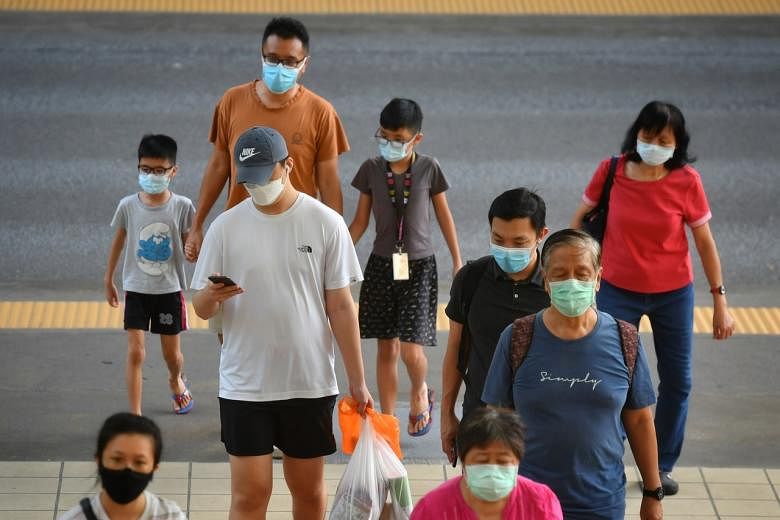SINGAPORE - Although small, Singapore intends to uphold its political and economic standing in a post-Covid-19 world, Senior Minister Teo Chee Hean said on Thursday (June 11) when he laid out the challenges the country will face going forward.
Regionally, it wants to be a good partner and contribute especially in promoting relations with close neighbours Malaysia and Indonesia.
On the world stage, small countries like Singapore can also have a voice and play an active role in international cooperation, he added, citing several multi-lateral partnerships the country leads or is part of.
Speaking in the third of a series of six televised ministerial speeches, Mr Teo said Singapore will always be a small, multiracial country surrounded by bigger neighbours, exposed to external forces beyond its control.
But it wants to contribute to a harmonious region, he said.
"We will continue to actively promote close ties and good cooperation with our Asean partners, especially Indonesia and Malaysia, not least to tackle Covid-19 together."
Singapore donated masks, test kits and ventilators to the two close neighbouring countries and other Asean members as a gesture of solidarity, said Mr Teo, who is also Coordinating Minister for National Security.
It is also working with the regional group and other key partners to curb the transmission of the coronavirus and to limit the economic fallout on the region.
With Malaysia specifically, Singapore is working closely on the cross-border flow of people and goods during the outbreak.
At the same time, bilateral issues that inevitably arise between close neighbours must be dealt with constructively, he said.
"We will try our best to resolve these issues and achieve a win-win outcome while protecting Singapore's interests," he said.
Problems must be managed and contained until they can be resolved, he added, to allow wider areas of cooperation for mutual benefit.
Highlighting several issues that will shape the world's future, Mr Teo said Singapore must also reach beyond the region to make itself useful to the world, even during the pandemic.
He cited examples such as keeping supply chains open and connected, and promoting trade by updating rules at the World Trade Organisation to suit the digital economy.
Mr Teo also highlighted the election of Mr Daren Tang as director-general of the World Intellectual Property Organisation (Wipo) - the first time a Singaporean will lead a United Nations (UN) agency.
Mr Tang will relinquish his current role as chief executive of the Intellectual Property Office of Singapore and begin his six-year term with Wipo in October.
Mr Teo said Singapore is also contributing to global action to tackle climate change as a small island state.
-
The national broadcasts by Singapore leaders will start from 7.30pm on the following dates:
June 7: Prime Minister Lee Hsien Loong.
June 9: Minister for National Development Lawrence Wong.
June 11: Senior Minister and Coordinating Minister for National Security Teo Chee Hean.
June 14: Minister for Trade and Industry Chan Chun Sing.
June 17: Senior Minister and Coordinating Minister for Social Policies Tharman Shanmugaratnam.
June 20: Deputy Prime Minister Heng Swee Keat.
All speeches will be televised in the four official languages. Or watch it on Gov.sg website, Facebook page, YouTube channel and Twitter.
For example, it submitted updated proposals on lowering its emissions to the UN Framework Convention on Climate Change in March.
"These are all key issues that will determine the shape of the world to come," he said.
Small countries have the voice and agency to act, said Mr Teo, even as they call on major powers to exercise leadership in strengthening international cooperation.
He cited several multilateral partnerships that Singapore leads or is part of.
These include the 30-member Global Governance Group, which provides inputs to the G-20; the UN's Forum of Small States, which Singapore found and still leads; the 11-member Comprehensive and Progressive Agreement for Trans-Pacific Partnership, which originated with an agreement between Singapore, New Zealand, Chile and Brunei; and the Regional Comprehensive Economic Partnership, which brings Asean and its trade partners together.
An "able and agile" foreign service has helped Singapore to play this constructive role on the world stage and create more opportunities and space for its people, said Mr Teo, adding that this is even more important with global changes brought about by Covid-19.
He said that developments arising from the pandemic have threatened an international system and global order that allowed countries to grow peacefully for over 70 years.
These include the US-China rivalry, global supply chains being upended, and social divisions fracturing societies and fuelling nativism and protectionism.
Countries are acting unilaterally to protect their own short-term interests, said Mr Teo, and this has handicapped international organisations as they seek a coordinated global response. "Generations of Singaporeans have grown up believing that globalisation and open markets are part of the natural order of things. We can no longer assume that this is so."












